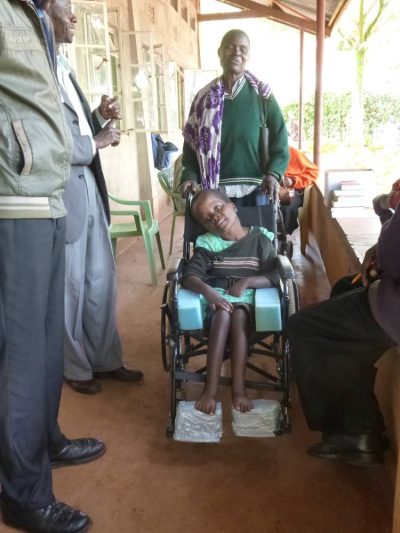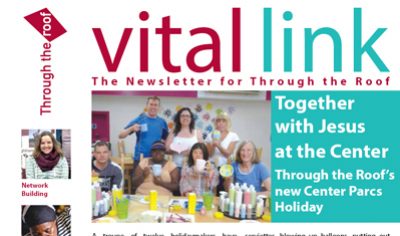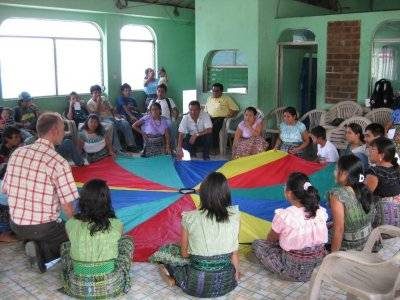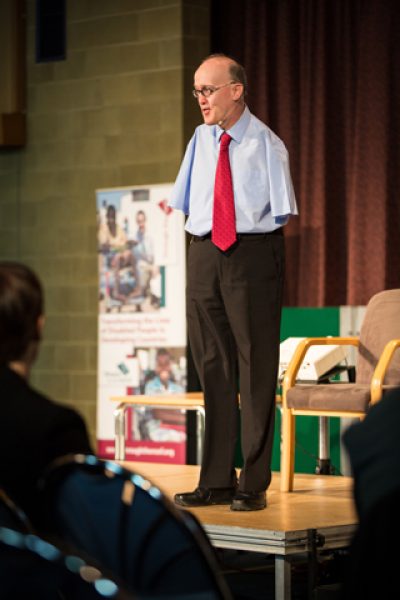Wheels in Elburgon 2016

A team from Wheels for the World are out in Elburgon from the 31st August to the 10th September, working hard to fit wheelchairs and other mobility aids to local disabled people. We'll bring you updates just as often as time and internet access allow.
(The photo is from a previous Kenya distribution - we'll get new ones up as soon as we have them).
Our Summer 2016 Newsletter

The Summer 2016 Vital Link Newsletter is now available for download - this issue contains stories from our new Center Parcs holiday, the Babbacombe holiday, plans for work in Sierra Leone, and much more. Take a look! Please note that a wheelchair sponsor form for Wheels for the World is included in this PDF
- Follow this link to download The Summer 2016 Vital Link (and Sponsor Form) - right-click and select 'save' to save the file for later
 Please get in touch (on 01372 749955 or by following this link to email us) if you have any problems downloading this, or if you’d like to receive future newsletters by post or email.
Please get in touch (on 01372 749955 or by following this link to email us) if you have any problems downloading this, or if you’d like to receive future newsletters by post or email.
Mental Health, God’s Way (Ros' Blog)

When we did our survey of disabled peoples’ experience of church, some of the respondents were people with mental health difficulties. Sadly, their experience was that churches had little understanding of these conditions and could be somewhat unhelpful in their approach as a result.
Having had family members with poor mental health I know how hard it can be to see a loved one suffer in this way, but also how easy to see “solutions” and become exasperated that the person can’t see it the way you do. Here are some of the comments made in our survey. They reveal how, all too often, people with mental illness feel misunderstood and unsupported:
- “Much damage is done when attitudes (and therefore words) are trite. I have stopped going to church mainly because of the trotting out of Bible verses which are nearly always said out of context.”
- “Accept me as I am, not on condition that I get miraculously healed or pull myself together and am like everyone else.”
- “I feel churches need to be aware and have empathy and real care for those with different disabilities including mental health problems as well as physical ones too.”
I love the way that the Bible doesn’t draw a veil over the difficulties experienced by the great servants of God, but allows us to see them with all their human frailties and struggles. Elijah is a good case in point. He is so zealous for the name and honour of the Lord that he sets up a contest against the prophets of Baal. Interestingly, we don’t actually read of God instructing him to do this, but nonetheless God honours his zeal and answers by fire.
The priests of Baal are defeated and destroyed. Jezebel’s wrath is aroused, and Elijah knows what she is capable of. He still has fresh in his memory the recollection of God sending him to confront her when she had Naboth killed and stole his family’s vineyard. So when she vows to make Elijah like one of the priests of Baal, his reaction is one of fear. He takes to his heels and flees for his life.
Why would a man who has just seen God show Himself invincible before the whole nation be afraid of a mere human? It seems that Elijah has expended himself so fervently in the cause of God that he has reached a point of burn-out.
The thing I find interesting about Elijah’s story is how God responds to his anxiety and severe depression. The day after his mighty victory Elijah is found asking to die: ““It is enough; now, O Lord, take away my life, for I am no better than my fathers.” And, like so many of us at times of distress or depression, he goes to sleep to shut it all out.
What would I have done at that point? I have a whole catalogue of Bible verses I might have spouted, designed to remind him who he was in God and motivate him to carry on. Not so God. He sends an angel who gently wakes him and feeds him, making no demands on him but simply and quietly ministering to him. The angel leaves him to sleep some more, and then wakes him to eat and drink again. God knows that Elijah’s immediate need is not for motivation, a pep talk or scolding for succumbing to fear, but simply nourishment and rest.
For almost the next six weeks, Elijah is striding away from community and into isolation. God doesn’t intercept him and say, as I might have done, “It’s no good moping alone. You need to get back into fellowship with people, not sit by yourself and ruminate on your negative thoughts.” Luckily for Elijah, it’s God, not me, who is dealing with him. God understands his need to get away and be on his own.
Finally, God knows Elijah is ready to speak with Him. Could God have begun this conversation with Elijah immediately when he first fled from Jezebel? Probably. But Elijah needs time to make the inward journey, and to face what is inside himself. God asks him what he is doing here, and all Elijah can do is point to the past and say, “I have been...” Preoccupied by his history, he cannot envisage a future for himself.
God allows the storm to rage around Elijah, a rock-breaking tornado, an earthquake and an intense fire, and finally, as if in contrast, God does not grab Elijah, shake him warmly by the throat and tell him to pull himself together, but instead speaks gently to him in a barely audible whisper. He asks the same question again, “What are you doing here?” We might think that after such a display of power and such a gentle sign of God’s love, Elijah might have recovered a hope for the future but no, he is still locked in his past, and once again responds, “I have been...”
“For goodness sake, man!” I want to cry. “Are you still dwelling on all that stuff in the past?” Thankfully this is not God’s reaction. Instead, He quietly gives him a specific, manageable task – to anoint a king and a prophet – and backs this up with a promise: Elijah will discover that he is not alone and abandoned as he feared. Somehow, he finds that he now has the strength to go back and face the commission he has been given – and as we know, eventually has a triumphant welcome into heaven, and becomes one of the “greats” of God’s kingdom who meets with Christ on the Mount of Transfiguration. God’s strategy for dealing with anxiety and depression works far better than ours, it seems.
Imagine if churches could follow this model of gently allowing people to retreat and rest, meeting their needs, being present with them in the storm, listening non-judgementally to their responses, speaking gentle words of quiet affirmation and encouragement, and finally helping them to get back on their feet and into serving God and his people by small, incremental steps. Churches would become a safe haven, not an arena where people feel judged and censured. May we learn from God’s methods and give hope to those among us who struggle in their mental health.
Hooray for Generosity (Ros' Blog)

I was recently at a meeting of another charity I’m associated with. We had met principally to pray, but before we did, the Director asked us to brainstorm some ideas about publicity and fundraising. We did come up with lots of ideas, and some of them may even have been usable. But there was something more interesting that came out of our deliberations.
We found ourselves discussing the difference between donating and generosity. Donating can come from a sense of duty, a feeling of guilt or even a desire to avoid looking stingy and appear big-hearted. But generosity is something else altogether. It is a grace that reflects the heart of God, and it brings blessing and happiness as much to the giver as to the recipient. You don’t have to be a Christian to be generous, and you don’t have to know God for your generosity to be a blessing to yourself, because God is in the business of blessing those who reflect his heart, whether or not they know Him.
This is why we love our supporters here at Through the Roof – whether they give regularly or occasionally, whether they support our holidays or sponsor a wheelchair, we know they are motivated by a godly generosity which brings an added dimension of blessing to our receiving as well as to their giving.
When our wheelchair sponsors receive their certificates, each one includes a picture of a person who has received a wheelchair, made possible by that giver’s generosity. When the sponsor opens the envelope and sees the photograph of a smiling person whose life has just been transformed by the gift of a wheelchair and a Bible in their own language, the blessing comes full circle, and their own generosity brings them happiness.
Generosity is a blessing because it is a godly characteristic. Both those who know God and those who don’t believe in Him, when they act out of generosity, reflect the character of the God who made them. But for Christians, there is an added dimension. Jesus said, “Truly I tell you, whatever you did for one of the least of these brothers and sisters of mine, you did for me.” When a wheelchair sponsor looks at the smiling face on the certificate, they can be sure that the same smile is on the face of Christ, for what they have done to this person in a far away country whose life has previously been unimaginably difficult, they have done to Him.
So I would like to say a big shout out for all our wonderful supporters, and a big hallelujah to God for the generosity out of which they give to us.
Front Line or Civilian? (Ros' Blog)

By Mandy Edwards
Back in early 2015 Mandy Edwards wrote this blog for us. Now she’s back again with more insights, and I am enjoying following the journey that God is taking her on. Mandy writes:
I had a mind-blowing revelation last night. Boom! Just as my eyes finally closed after a particularly challenging day it hit me hard. I live in the aftermath of a serious spinal injury 6 years ago so my idea of a busy day would be very different than most, as I was registered disabled with care needs after the accident. My son and canine partner still live with me and give me so much support but day-to-day life remains a challenge. I can’t work yet but am trying to rebuild my mobility and grab back lost health so I can one day. It’s exhausting as everything takes so much longer and I am often hampered by frustration. I’ve made so much progress since my wheelchair days but chronic pain is still an on-going issue. As a result I usually sleep badly and tonight I’d been grateful when my eyes finally began to droop.
As the vision flooded my mind my eyes flew wide open, and I felt alive for the first time in 6 years. I had finally got it! I could have power. I could have authority but it wouldn’t be mine! It would be God’s. My vessel was broken and I was officially feeble but that was the point wasn’t it? A cracked vessel may be damaged but it’s those very cracks that allow the light to shine through! That’s why God has often chosen the damaged, rejected and scorned.
But God chose the foolish things of the world to shame the wise; God chose the weak things of the world to shame the strong. (1 Corinthians 1. 27)
In my vision, to access His power I’d got to know Him better. To get to know Him better I’d immersed myself in His Word. The Bible wasn’t just a 2000-year-old historical document. It was a Living document, pulsing with His power! The purpose of reading it was to encounter Him in its pages. So I began a campaign of study, rising an hour and a half earlier every day so I could fit it in before my physical challenges distracted me. As that vision faded I’d leant across my bed and grabbed my Bible to find the right section. There it was.
For our struggle is not against flesh and blood, but against the rulers, against the authorities, against the powers of this dark world and against the spiritual forces of evil in the heavenly realms. (Ephesians 6. 12)
We are in a Holy War! We are all soldiers in a battle but it isn’t the usual kind of battle. We are fighting against unseen but very powerful forces. Satan, the Prince of this world, and his foot soldiers are everywhere, both on earth and in the supernatural realm, tormenting us with feelings of anger, hate, greed, dissatisfaction, lust, doubt, despair, jealousy and frustration and leading us astray through counterfeit spirituality. This is real and it finally answered that question that had tormented me since my accident. Why did a loving God allow suffering?
The army is an organisation full of soldiers from the Private to the Field Marshall. It’s the foot soldier that is most likely to get wounded, and it’s the brigadiers and commanders who make critical decisions about where and when the platoons and companies will be mobilised. They are the brains of the operation and the privates are the marching feet, the ones most likely to be shot at, blown up, killed or maimed. Yet God’s army is very different. He did not strategize behind the lines and send out His foot soldiers. He sent out His only son Jesus to become human, to don his private’s uniform and go out in front of us as a foot soldier. Jesus Christ took the first fatal hit and showed us that physical death is not the end and not to be feared. He never promised us that we wouldn’t suffer but He did promise us something far more precious. He promised us that he would go ahead of us and prepare a place for us in heaven so that we could live with Him for all eternity.
And if I go and prepare a place for you, I will come back and take you to be with me that you also may be where I am. (John14. 3)
The more we suffer in life the closer we draw to Christ’s suffering and to Christ Himself. If we are living happy, uncomplicated lives, apparently free from suffering and pain then we miss out on the experience Paul called 'the fellowship of His sufferings'.
Some of us fight the fight but then become immobilised by pain, anger, fear, disease or disability (I’m a good example of this) and become bitter when our battle wounds disrupt our lives. Yet history has shown us that in God’s hands battle wounds can become powerful weapons. Some of His casualties have gone on to become powerful Generals in this Holy war, recruiting thousands for Him. Joni Eareckson Tada became paraplegic at 17. Now she is an evangelical speaker, author and founder of Joni and Friends, a charity that provides wheelchairs across the third world for those with disabilities. Christine Caine, a child abuse survivor, founded the A21 campaign which rescues victims of sex trafficking and fights to abolish it in south-eastern Europe. John Ramirez had an impoverished childhood, became a high ranking satanic warlord and recruited thousands for Satan. He is now an International evangelist, author and the founder of John Ramirez ministries. Cracked vessels who have shone far and wide for Christ. No soldier who signs a contract with the army signs that contract conditionally, provided they don’t get hurt! No Field Marshall can offer that condition. So as Christians we need to be prepared to sign our contracts unconditionally. We won’t be offered a pain free life but we can be certain that we will never die.
To be invincible we need to stand together, accept each other ‘warts and all’ and work together with one vision. If we fight amongst ourselves we will lose the war. We need to stand united. We are the body of Christ and we all have different roles but like any human body we all need to be functional for the body to thrive. We all know that it takes just one hormone, enzyme or blood cell level to be out of sync for an entire body to become really sick. We must not exclude anyone or discourage their contributions, however vulnerable or different they seem to us. We are in this war together and all of us have a part to play. It is not for us to judge another’s worthiness, that’s up to God. Whenever I get stuck on this point (someone irritates or frustrates me) I just imagine how I must appear to God right now. Standing there all dirty and scuffed and covered in muck complaining about one of His other children! Strange how that feeling of irritation magically disappears when I think this way. We also need to make sure that all our soldiers are spiritually prepared and protected in battle.
We need God’s armour of honesty, integrity, courage through the Gospel of peace, right mind set, unshakable faith and a daily focus on the Word of God.
Stand firm then, with the belt of truth buckled around your waist, with the breastplate of righteousness in place, and with your feet fitted with the readiness that comes from the gospel of peace. In addition to all this, take up the shield of faith, with which you can extinguish all the flaming arrows of the evil one. Take the helmet of salvation and the sword of the Spirit, which is the word of God. (Ephesians 6. 14-17)
For years I had experienced both suffering and a passion for Christ’s love but I didn’t study His Word every day. I didn’t know Christ’s personality because I didn’t take the time to become His personal friend. Many of us will turn to our family and closest friends for help when we feel troubled and accept their advice even when we would rather do something different. Why do we do this? Because we have lived with them, spent quality time with them, and know that they ‘get’ the real us. Christ knows each of us intimately but can we say the same the same about Him? I went to church religiously and listened to the Word eagerly but only got a snapshot view. How could I understand Christ if I wasn’t willing to spend the time every day to “get Him” too? On my Christian journey I have learnt one important fact by trial and error. The Word of God is as important to us as water and food. Without it we die. But if Christ is our Field Marshall we can never die.
Me Before You (Ros' Blog)

There are many things that Christians may disagree about, some of them peripheral and others perhaps more foundational. But one thing I think all of us can agree on is that the Bible gives a clear picture of every human being as made in the image of God and being of infinite value because of being chosen, created and loved by God. As a result, no life is insignificant, and every human being matters to the moment when they draw their last breath.
I am thinking about this at present because I have just come back from seeing Me Before You, and honestly, it is hard to know where to start analysing all that is wrong with this film. It typifies the anxiety of the 'worried well' that disability must be unendurable – something most disabled people would strongly disagree with. The story is of Will, a young man paralysed in a road accident, who falls in love with his carer/companion, Louise, but nevertheless opts for suicide, handily leaving her a small fortune.
Perhaps one of the best ways I can convey this is to ask you to imagine a film in which a black person living in a largely white community (and played by a white actor 'blacking up') concludes that his life is so unlike that of the white people around him that he would be better off dead, and obligingly commits suicide, leaving a large amount of money to someone who is thus conveniently enabled to leave a life of poverty and restriction in order to better herself. Of course Hollywood would never make such a film – there would be outrage at such dehumanising and belittling of someone for their ethnicity, and quite rightly too.
But apparently Hollywood has no such qualms about a non-disabled actor 'cripping up' to tell us that if you lose the physical abilities you once had, nothing – not even the vibrant and devoted love of a person full of life and zest – can ever make your life worth living again. While this is not seen as acceptable based on ethnicity, gender, sexual orientation or any other trait, disability is placed into another category and it is apparently tolerable to diminish the value of disabled people’s lives to the point where they should consider themselves better off dead.
Why, in the twenty-first century, is such an idea even countenanced? The messages of this film seem to be:
- If your current boyfriend is enough of a selfish pig you might even fall for a cripple
- Even the strongest of human spirits is not indomitable enough to weather a terrible storm and wait for life to feel better again
- Needing assistance with bodily functions robs you of all your human dignity and leaves you with no hope but to find 'dignity in dying'
And that’s the key to the message of this film. There is a highly lucrative business in persuading people to believe that assisted dying affords more dignity than assisted living. Of course it is far cheaper for health insurers in the US and the NHS in the UK to kill someone than to provide for their lifelong care. But is that any reason to keep pushing this message into the public consciousness? The teaching of the Bible and the example of Jesus tell us that no price is too great to put on a human life.
But there is a money-making racket around the euthanasia industry; it is scandalous, but a lot of money is being made by persuading people that they are a burden and that they have no future. This film draws a veil over the realities of assisted dying. It does not show the moment of administration of the lethal dose, nor of Will’s death. There may be good reason for this – statistics show that 23% of assisted suicides and 9% of cases of euthanasia experience complications including failure to die, failure to induce coma, waking up after coma or taking longer than expected to die. One study in the Netherlands, where assisted suicide and euthanasia are legal, showed that 18% of assisted suicides turn into euthanasia cases because the patient fails to die and the doctor has to administer a lethal injection.
No doubt this is in part why, as I am writing, it has just been announced that 63% of doctors in the UK have voted against a motion for the BMA to abandon its traditional opposition to assisted dying. The Netherlands is a salutary example, because increasingly, its elderly patients have had to take to wearing badges saying, 'Doctor, please don’t kill me.' Even here in the UK, I am regularly asked if I would like 'Do Not Resuscitate' written on my healthy, young, disabled daughter’s medical notes, something no one ever asks about her non-disabled sisters. (If you haven’t already signed my petition against this, you can do so here.)
I am not seeking to diminish the intense grief of someone who has led an active life and suddenly becomes disabled. And I know at first hand the grief of a parent whose child becomes disabled – enormous enough when it happens, as in my daughter’s case, at only 9 weeks old, and probably heightened all the more when the child has led an active, athletic life before becoming disabled. But that is only the beginning of a long story, and this film tries to make it the end.
When I was a teacher euthanasia was one of the topics I had to teach. I used to show my classes a Channel 4 documentary about the battle of Diane Pretty to have a suicide lawfully assisted by her husband – a battle which went all the way to the European Court of Human Rights and was defeated at every stage by wise judges who could see, far more than this poor woman who was being manipulated by a pro-euthanasia organisation for its own ends, the far-reaching, unintended consequences that such a ruling would have.
I used to point out to my classes the many fallacies in the documentary – for example, when the care staff performed for the camera a soiled pad change and the narrator explained how terrible it was to have lost all human dignity in this way, I explained to my students that for many years I’ve had carers coming in to assist with this task for someone I care for, and we all make light of it and carry it out with cheerfulness and humour. The sense of loss of dignity is not a fact but an attitude, and one that, in Diane Pretty’s case, was being stoked up to the maximum by a disingenuous organisation campaigning for euthanasia. Shockingly, her mother said, “If it was an animal, you would have it put down” – but the point was that Diane Pretty was not an animal but a precious human being whose life was greatly enriched by the faithful love of a devoted husband and family.
Some things in the film Me Before You are just plain silly – when Louise peels back Will’s bed sheets, it reveals an improbably muscular torso and arms for someone who has been a quadriplegic for two years. Miraculously, Will’s bodily functions suspend themselves unless his male carer is present, so the love of his life never has to deal with a bag of urine or a soiled pad. And, having repeatedly nursed my own quadriparetic daughter through many a bout of pneumonia, to see him lying in hospital, at death’s door from pneumonia, his skin a rudely healthy pink, made me want to laugh out loud, and underlined the fact that this is a film made by non-disabled people, for non-disabled people, both of whom have no idea of the real magnitude of the problems presented by severe disability, nor of the heights of triumph of which the human spirit is capable.
As Christians we have to counter this terrible message that disabled lives are disposable. We have to affirm to our disabled friends and loved ones that their lives are significant, worthwhile and treasured. And perhaps we should be pointing out to friends who go to see this film that if someone is suicidal, he isn’t suffering from disability, he’s suffering from depression, and the solution is not to kill him, but to treat his mental health.
If you want to see an antidote to the terrible message of this film, why not take a look at Through the Roof’s video See The Possibility, and if you like its message, you could share it via social media so people can see that Me Before You doesn’t have the last word.
(Image is the theatrical release poster for the movie)
All You Need is Love (Ros' Blog)

I love the way that Jesus approached people, as recorded in the Gospels. He didn’t overthrow convention just for the sake of it, but nor did He allow Himself to be bound by convention when love demanded a different way.
For example, when the synagogue leader came to plead with Him to heal his daughter, Jesus treated him with the respect due to someone in his position, stopped what He was doing and went with him. But when a woman touched His cloak in search of healing and tried to slink away unnoticed, He knew how important it was to affirm her, to show her that she mattered to Him, and to commend her faith. And so the synagogue leader was kept waiting; the deference due to his position was placed below the dignity of a mere woman, and a woman who was an outcast at that.
When Jesus was welcomed into the home of Lazarus and his two sisters at Bethany, He not only indicated that He didn’t consider a woman’s place to be in the kitchen, but He even encouraged the women to sit at His feet to listen and learn as equals with the men, something no other rabbi would ever have countenanced doing.
When the paralysed man was lowered through the roof down to where Jesus stood, the whole crowd waited expectantly for Jesus to pronounce words of healing, but at first he didn’t do so; He began by addressing him with a word which the New Testament writers translated into the Greek as “ἁνθρωπη” (“anthrope”) – a word denoting “human being”. In front of the whole crowd, Jesus affirmed the paralysed man’s full humanity. Next He spoke of forgiveness of sins, a prerogative that belonged to God alone, and only once that supremely important business was dealt with did He turn His attention to the physical cure the man was seeking.
When His disciples were criticised for picking and eating grain on the Sabbath, He pointed out that the Sabbath was supposed to be something people benefited from, not the other way round. When His disciples came and told Him the Pharisees had been offended by something He said, He dismissed them as blind guides trying to lead others, and falling into a ditch. When, in the middle of His sermon, someone shouted out, asking Him to settle a dispute, He didn’t tell them to either sit down and shut up or leave. Instead, He used the interruption as an opportunity to address the problem of materialism.
It wasn’t that He had no time for tradition, position or custom, but simply that these things always had to give place to whatever His Father wanted Him to do, which was always to love in some practical, life-transforming way.
As churches we can perhaps be too wedded to our conventions to see when God is doing something different. I heard a while ago about a young autistic man who called out three times in church, “Jesus is Lord!” and after the third time, his family were asked to remove him. That kind of exuberant shouting in the middle of the worship or the sermon didn’t fit with that particular church’s convention of how Sunday service should be conducted. As a result, a family felt sidelined and rejected. I can’t imagine anyone going away from an encounter with Jesus feeling like that.
By contrast, on a recent Sunday morning my church was meeting in an unfamiliar building, with not the usual person leading the meeting, and instead of starting with singing, we began with an activity focused on helping the children to think about how God speaks to them. For my autistic daughter, Ellen, this was a lot of change to process all in one go. Eventually she couldn’t contain herself any longer, and leaning forward in her wheelchair and pointing at the speaker, she shouted, “Excuse me, man! Excuse me, man!” As soon as he looked her way, she continued, “There will be worship songs!”
No one asked us to leave, no one tried to quiet Ellen, or tutted at me for not keeping her under better control. Instead, the speaker said, “We’ll see, let’s finish this activity first and then we can talk about that.” And once the activity was over, and we started to move into something else, another member of the congregation stood up and said, “I want to respond to what Ellen said to us at the beginning, and while we’re doing this, I’m going to go and sit at the piano and play some worship songs.” And he did so, with the result that the morning’s activity, which for once didn’t involve singing, was able to proceed as planned, but Ellen’s need to hear some worship music was also met.
In my last blog post I put out a plea for us to learn from the Master Himself how to approach our disabled brothers and sisters. And here, I believe is another way we can learn from Him. Conventions can be important. They can ensure that events run smoothly, that people are respected, that order is maintained. But they should never override the supreme command which Jesus left us, to love one another. We’re not called to go round rubbishing people’s traditions or ways of doing things, but whenever there’s a conflict between doing things the way we’ve always done them or making room to give love to someone, especially to a disabled person whose needs may differ from other people’s, love should always triumph, just as it did in the ministry of Jesus.
Golf Fundraising Day

Following our last successful Golf Day in 2014, we’ll be holding another fundraising day of fairway fun on Friday 22nd July 2016. Come along, support the work of TTR, and enjoy the day’s activities, including an 18-Hole Stableford Competition, Blindfolded Putting Competition, and Wheelchair-seated Longest Drive.
The whole day begins with registration at 8am, and costs £65 a head, including coffee and bacon roll on arrival and a two course lunch.
It's at Tyrrells Wood Golf Club, The Drive, Leatherhead, Surrey, KT22 8QP. To find out more, and book your place, please follow this link to email Margaret Bale.
A Master-Class in Disability Inclusion (Ros' Blog)

“We had a problem at church on Sunday,” someone told me as we chatted at the Big Church Day Out, “a disabled lady in our church was disgruntled because she felt people were ignoring her. But the thing is, we don’t always want to be swamping her with offers of help. It’s difficult to get it right.”
I tried to make some suggestions as to how to strike the right balance, but I couldn’t help reflecting on her words after the event was over. On an earlier occasion, a lady had told me, “At church everyone just assumes that any time I ask for help or for prayer it must be something to do with my disability. But one time I just wanted prayer because my mum had died, and no one gave me the opportunity to say so.”
So how do churches “get it right” for their disabled members? How do they give them enough assistance to participate fully, but not so much assistance that they feel singled out as Exhibit A? How do they give them an opportunity to say what is really on their mind, and not just assume that it must be disability-related? How do they enable disabled people to exercise their gifts fully for the blessing of the church?
In this, as in any area of church life, Jesus is the supreme role-model. In Mark 10. 46 – 52 we read,
As he was leaving Jericho with his disciples and a great crowd, Bartimaeus, a blind beggar, the son of Timaeus, was sitting by the roadside. And when he heard that it was Jesus of Nazareth, he began to cry out and say, “Jesus, Son of David, have mercy on me!” And many rebuked him, telling him to be silent. But he cried out all the more, “Son of David, have mercy on me!” And Jesus stopped and said, “Call him.” And they called the blind man, saying to him, “Take heart. Get up; he is calling you.” And throwing off his cloak, he sprang up and came to Jesus. And Jesus said to him, “What do you want me to do for you?” And the blind man said to him, “Rabbi, let me recover my sight.” And Jesus said to him, “Go your way; your faith has made you well.” And immediately he recovered his sight and followed him on the way.
There are several things I notice in this story. Firstly, a blind beggar sitting by the roadside must have been quite noticeable, especially to Jesus whose mandate, according to Luke 4, was “to proclaim liberty to the captives and recovering of sight to the blind.” Yet Jesus didn’t make a beeline for him, or draw attention to him in any way. However, as soon as Bartimaeus learned that it was Jesus passing by, he immediately wanted to attract His attention, and began calling out to Him. And without hesitation, Jesus responded to his call. We could learn much from this in churches – to treat disabled people just as we treat every other member, without drawing attention to any difference, yet ready at any moment to respond to a request from them.
Jesus did not respond by going to him, helping him to his feet and drawing very public attention to his disability. Instead, He allowed him the dignity of making his own way over, just as any other person would have done. It would not have been necessary to give him that level of assistance since, as the story makes clear, he was capable of leaping to his feet, throwing off his cloak and making his own way to where he heard Jesus speaking. We would do well to follow Jesus’ example of respecting people’s independence.
Once he was within speaking distance, Jesus asked him, “What do you want me to do for you?” Jesus’ mission was to heal, and yet He made no assumptions about what Bartimaeus wanted from Him. Perhaps Bartimaeus might have perceived his own greatest need as loneliness, or financial hardship. Jesus gave him the opportunity to articulate what he himself saw as his most pressing need. Only when Bartimaeus replied, “Rabbi, let me recover my sight” did He heal him of his blindness.
And finally, Jesus continued to respect his autonomy after the healing. He didn’t direct him where to go, or tell him, “Now you have an amazing testimony, and it’s your duty to go around witnessing to what God has done.” Instead, he left Bartimaeus to decide where to go and what to do. Understandably, Bartimaeus’ decision was to follow Jesus. Why wouldn’t he stay as close as possible to the one who had respected his dignity and given him the gift of healing?
In our churches, we can learn so much from this. We should be ready and available to help our disabled members, and we should create an atmosphere in which they feel able to reach out to us for whatever they need. It’s not wrong to ask if help is needed, but it’s good first to give people the chance to decide whether to reach out for assistance. We should give help where needed and respect independence where help is unnecessary. We should not assume we know what the person needs, but give them the opportunity to express what it is they are looking for, and we should not assume what gifts they have and how they want to exercise them, but should give them the space and freedom to become all God wants them to be and to follow Jesus wherever He leads.
Opportunity for Churches: Reaching the Most Unreached People
90% – 95% of the world’s disabled people die without ever hearing the Gospel, according to the Lausanne Committee for World Evangelization. Disabled people are one of the world’s most unreached people groups. Christian disability charity Through the Roof would like to partner with churches to change that and is inviting UK churches to participate in a new survey into churches’ experience of their disabled members.
Training Resources Developer Ros Dakin explains, “We want to hear from churches about all the creative ways in which they are engaging with the disabled members of their communities, and also any questions they have about how they can serve disabled people in the spirit of Luke 14, the Scripture in which Jesus reminds us that without disabled people His house is not full.”
You do not have to be a church minister to take part in this survey; Through the Roof would love to hear from both ministers and church members who can submit answers to the following four questions:
- What one thing do you want to know about disability?
- What is the biggest insight you have received from disabled people and their families about the Christian journey of faith?
- How are disabled people in your church exercising their gifts to build God's kingdom?
- Do you have an example of your provision for disabled people that could encourage other churches?
(please use the following to shape your response...
- Name of activity/project
- Why do you do what you do? (your motivation)
- Whom do you serve?
- What do you do?
- How do you do it?
- Where and when does it happen?
Answers can be submitted by email to our office, by post to Ros Dakin, Through the Roof, PO Box 353, Epsom, KT18 5WS or by telephoning 01372 737042. You can also reply by posting to our Facebook page, or tweet your replies to us, @TTR_uk. The questions can be supplied in large print or braille on request.
In 2014 Through the Roof carried out a survey into disabled people’s experience of church in the UK. The survey revealed some examples of excellent practice in churches around the country, but also some unfulfilled needs. The two biggest findings were a need among disabled Christians for genuine, reciprocal, fulfilling friendships, and a wealth of spiritual experience and gifting which disabled Christians are longing to share with their sisters and brothers in Christ. The full results of the survey, together with an extensive index of resources to help churches address the issues raised by disabled people, have been published under the title All of Us Complete in Christ, and can be downloaded free from our website.

